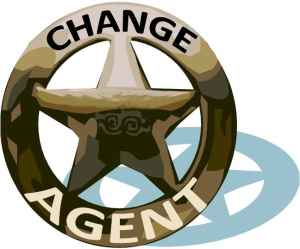
Key activities of a Change Agent:
To formulate and implement the change programme
To gain acceptance of the change so that it is internalised into daily operations, ideally through commitment and motivation
To interface between change, the organisation and those involved in the change process
Principle:
Managing change trough projects may be a team approach but a focus for the team – a project manager – is essential. Key activities of the project manager include
- Agreeing and communicating to others the main goals of the project
- Whether involved at the diagnosis and planning stage or not, the project manager must be able to communicate the goals of the team and ensure they understand what is expected from them as a team and as individuals
- Building team cohesiveness trough activities such as team building, role clarification and work breakdowns, it is the project manager’s role to build team commitment to the change and to the team
Developing individual team members skills and expertise trough, for example, job allocation, training and experience, whilst ensuring the project goals are met
Issues:
Boddy & Buchanan, 1992:
Complex change, unclear goals and priorities, and high reluctance – interpersonal competence important
Senior executive as agent both advantages and disadvantages (power and symbol vs fear and information)
External consultant (free souls and competence vs lack of involvement and knowledge)
Manager (awareness and network vs existing preference and conflicts)
Applications:
To describe and understand the role of the project manager – the change agent.
Source of Change Agent – The role of the project manager:
Henley Business School






